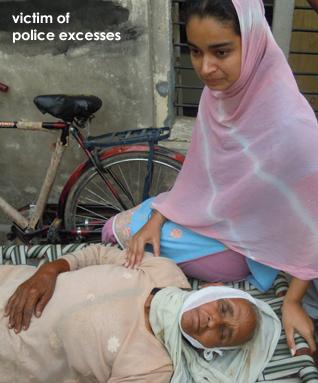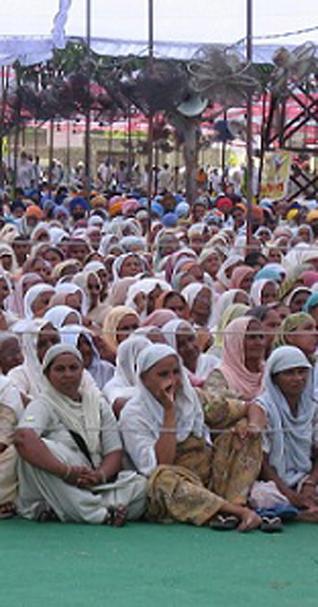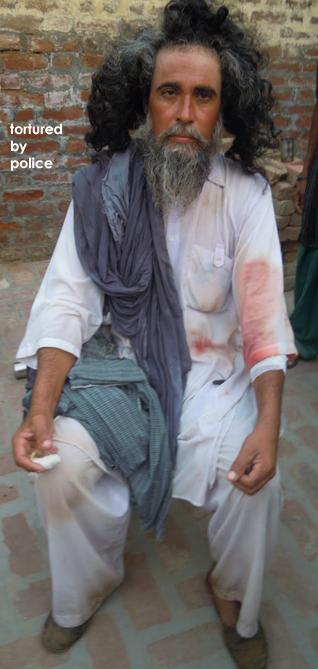Current Events
The Gobindpura Struggle: Women At The Forefront
by MALLIKA KAUR
Amandeep Kaur explains, as a marker of her family's honour, how she had never even glanced towards a police station, a place for men, all her life.
At least not until the summer of 2011.
Her perspective changed when her village of Gobindpura, in southern Punjab, was declared the chosen site for a new thermal power project that required the acquisition of the villagers' ancestral farm lands. Her decision to participate in citizens' protest resulted in five arrests and detentions at the police station, several beatings, sexualised taunts and severe threats.
WOMEN'S ISSUES ARE HUMAN ISSUES
Amandeep's story, captured in a November 2011 Youtube video that is gaining popularity, reminds us of the simple truth: women's rights are in fact, simply put, human rights. 'Women's rights' are often conveniently seen as 'special,' thus softer. A preoccupation with women's bodies sadly determines for some, which issues are labeled as 'women's issues' and generally often include rape, domestic violence, and reproductive oppression.
Removing this 'special status' around women's rights is necessary since it comes with the patronising presumption that women are weak and need generous protection; the nature and scope of this protection determined by the 'protectors.' Removing the special status acknowledges that women, like all humans, have the right to freedom from vulnerabilities - to their bodies, their livelihoods, their day-to-day living.
Those who stand up for this right are simply doing the right thing, and not engaging in some form of 'special,' generous charity. And women themselves are at the forefront of this rights-based work.
Further, Amandeep's story illustrates that when women assert their rights, they also simultaneously impact other human right concerns that threaten our communities. It shows how rather than asking for 'special' treatment, women are standing up and sacrificing for the inclusive development and rights for all.
In Amandeep's village, these rights - to work, to liberty and security of person, and indeed to life itself - were threatened by a power company and its nexus with the state forces.
POOR-RICH GAP IMPACTS WOMEN
The power company acquiring lands in Gobindpura - Poena Power - is no foreign agency, but rather a reported subsidiary of the Indian conglomerate Indiabulls.
And just last month, India was rated as an 'extreme risk' country on the Women's and Girls' Right Index (WGRI), by the United Kingdom based risk analysis company, Maplecroft.
Maplecroft warns global companies entering such 'extreme risk' emerging economies of the danger of possible complicity in "violations (against women) committed by state security forces or other actors."
This might be especially relevant in the light of the late November changes to foreign direct investment and further opening of the Indian retail business sector to multinational companies.
However, the struggle in Gobindpura illustrates how women's security is also at immediate risk because of the growing gulf between the poor and the rich within India, because of the insecurity faced by a majority of rural families.
Braving imminent risks in the face of such insecurity, the villagers of Gobindpura protested through Summer 2011, almost at the same time as the growing Occupy Movement on the other side of the globe, but with even lesser media attention. "We are the 99 per cent" is the predominant slogan of the Occupy Movement in the U.S., as people have taken to occupying public spaces, starting with Wall Street, the symbol of American capitalism. The slogan represents the chasm in the U.S. between the wealthiest one per cent and the rest of the population.
The Gobindpura protestors were protesting similar inequality in wealth and power. While the Western protesters are occupying public spaces in protest, the Gobindpura farmers are protesting to reject the occupation of their private property. And Gobindpura's women and girls made the conscious decision of protesting alongside their men. For the lands at-risk were as much markers of their ancestry, identity, and livelihood as of their male counterparts.
DARE OF WOMEN PROTESTERS
Beginning in June 2011, women sat and marched in protest, in the face of the reality that many of the village men had already been arrested, thrown in jail, and tortured. The women were treated no differently. Their clothes were torn, their hair pulled, and they were caught in clouds of red, as cannons sprayed water mixed with red chilli pepper. As they were arrested and detained, police officers reportedly recommended to them that their only way out was to accept the compensation checks from the company.
As the agitations in Gobindpura caught the attention of other farmer and labor unions, the village was cordoned off by police forces, denying any ingress and egress, who then proceeded to fortify their constant presence by several means, including converting the sole village health dispensary into a police camp. Given its pre-election season in Punjab, the Gobindpura issue was also ripe for selective attention from opposition political-parties-in-waiting, but in the face of government and corporate pressure, no real alternative existed for the villagers.
Gobindpura is not a lone example of land acquisition or the agrarian neglect in Punjab; farmer unions and NGOs report over 50,000 debt-induced farmer suicides over the last two decades in what is often dubbed as the 'bread basket' of India. However, unlike other places that remain obscure, Gobindpura has now gained profile, and due to a confluence of political factors, some relief, whether in the form of alternate government jobs or negotiated higher settlement, seems more likely here.
Nonetheless, for all the action in and around Gobindpura, the power company has begun construction of the plant, mostly unfazed.
It was in an attempt to oppose this foisted and exclusionary development, that thought nothing of the poor and the vulnerable who were going to be uprooted by it, that the women of Gobindpura entered the larger male-dominated spheres with an intensity and at huge personal cost. Yet this bravery has largely gone unrecognised. Since the protestors lacked profile and were up against powerful forces, their behaviour seems to have been criminalised with little debate.
RE-EVALUATE WOMEN'S RIGHTS
The reaction to the Gobindpura women protestors has included violence and indifference. On top of the grotesque treatment meted out to them, there has been commentary chiding these women for not 'staying in their place'.
This incident should force us to re-examine our assumptions about women's rights and empowerment in Punjab and beyond. Amandeep and her friends remind us once again that women ask for no special treatment, but only, as the Sikhs say, for "sarbat da bhalla," the welfare of all. For this, we must focus economic and social programmes that take everyone into consideration; inclusive development is an imperative and not an option.
The author is a U.S.based lawyer who focuses on gender and minority issues in the United States and South Asia.
[Courtesy: Tribune]
January 2, 2011
Conversation about this article
1: Baldev Singh (Bradford, United Kingdom), January 02, 2012, 9:57 AM.
Disturbing images yet again of brutality. World leaders do not talk about human rights abuses in India because they need to sell them goods and arms! And selling arms to anyone who is willing to buy, regardless of the morality of it all, means easy profits and jobs and votes!
2: R. Singh (Canada), January 02, 2012, 2:05 PM.
The dead silence on this issue is amazing after all the press about excesses in other countries. Perhaps the need is to expose the 'investments' of the political goons who come here to park their ill-gotten money, through touts and sycophants who promote them as overseas wings of their political parties, by boycotting their businesses here to begin with.
3: R. Singh (U.S.A.), January 02, 2012, 7:58 PM.
This is the youtube video mentioned in the article. Title: Police Brutalities on Punjabi Girls http://www.youtube.com/watch?v=WXc8rIGC5Sw
4: Gurteg Singh (New York, U.S.A.), January 03, 2012, 6:19 PM.
There is an overall shortage of land in India because of population explosion, and huge development of industries and housing colonies. Therefore these mostly Hindu industrialists and developers use Indian Government's bureaucrats, corrupt politicians and criminal police to steal the large tracts of land of these poor farmers who have been living and farming on these lands for many generations. The entire Chandigarh development and many IT parks were developed on lands which were forcibly acquired from Sikh farmers for a song and then resold by Hindu developers, sometimes at more than 100 times for what they paid. Sikhs as occupied people have a choice - free themselves from the Hindu yoke or be prepared for even much worse.
5: Manjeet Shergill (Singapore), January 05, 2012, 8:47 AM.
It's best for us Sikhs to completely distrust all in India - get united, own and control our media, our army and take back our land, our homes, our heritage. It's time Sikhs are not used/ abused for the stupid way India is run - the Prime Minister needs to reflect on his moral and spiritual role and be useful in Punjab - not support a corrupt and evil India. Forget Khalistan, reclaim Punjab back. It's a shame Sikhs cannot yet do this. There was a Mai Bhago who stepped forward when men lost it. These women are representing the spirit of Mai Bhago. May God bless each and every one of them.
6: Bibek Singh (Jersey City, New Jersey, U.S.A.), January 05, 2012, 7:41 PM.
Kudos to people like Bibi Amandeep Kaur ji, for truly displaying the Khalsa spirit!






